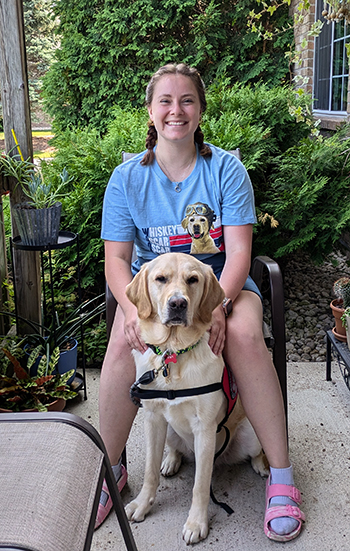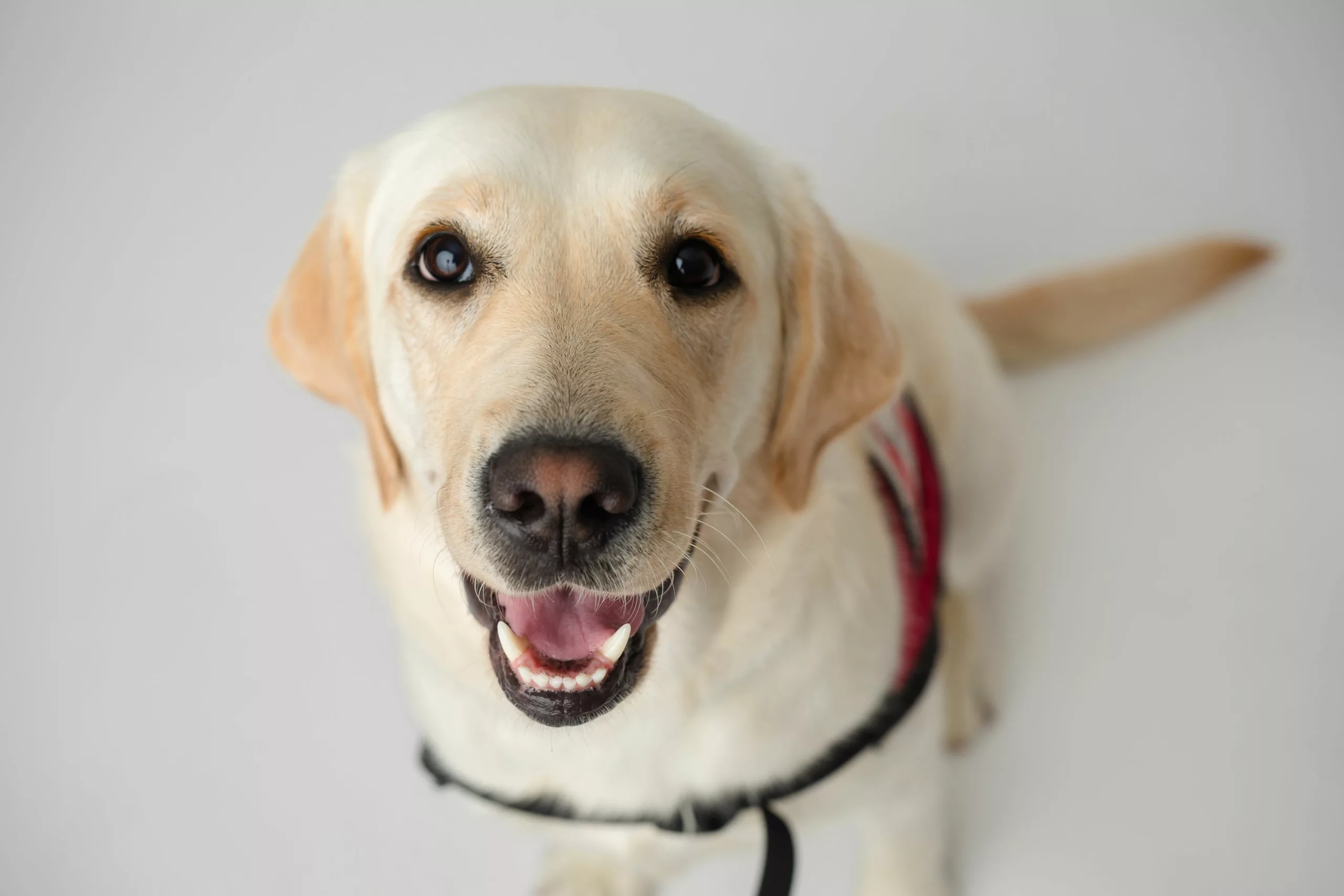By Beth Billstrom -
 Kayleigh snuggles closer to Mobility Assist Dog, Winston. “Life is so amazingly different now that I have Winston!” she shares joyfully. “I am beyond grateful for him and all that he brings into my life.” Kayleigh takes a deep breath, growing a bit more subdued as she thinks back to her life before Winston. “My story is a bit different because my disability is invisible. Only the people who see me daily and are involved in my life realize that I struggle. For that reason, as much as I love Winston, it was difficult for me to even apply for an assistance dog. But I’m so glad that I did. What a difference Winston makes for me and everyone around me.”
Kayleigh snuggles closer to Mobility Assist Dog, Winston. “Life is so amazingly different now that I have Winston!” she shares joyfully. “I am beyond grateful for him and all that he brings into my life.” Kayleigh takes a deep breath, growing a bit more subdued as she thinks back to her life before Winston. “My story is a bit different because my disability is invisible. Only the people who see me daily and are involved in my life realize that I struggle. For that reason, as much as I love Winston, it was difficult for me to even apply for an assistance dog. But I’m so glad that I did. What a difference Winston makes for me and everyone around me.”
Kayleigh has a disorder called POTS, Postural Orthostatic Tachycardia Syndrome, which causes dizziness or lightheadedness due to a disruption in blood flow. Although not diagnosed until recently, she’s struggled with POTS all her life. “I remember passing out as early as kindergarten. I also passed out a few times in high school. After each incident, my family and doctors thought it was due to things like lack of eating or sleeping. My legs also would begin hurting if standing for too long, so I’d sit down, even on the soccer field! At the time my family thought it was a little funny. I’d get teased for being lazy or inattentive. They loved me and weren’t teasing me to be hurtful. But since there was no concrete diagnosis, no one took what was happening to me too seriously.”
Eventually, Kayleigh began a teaching career and moved out on her own, living over an hour away from her family. She explains, “When I felt an episode happening, I would call and try to keep the phone close to me in case I passed out. The person I called would then be talking to me or yelling at me trying to keep me coherent. While POTS isn’t life-threatening, this still wasn’t a great solution. I was also growing more concerned about working. I need to work, but I certainly didn’t want anything to disrupt my classroom.”
Kayleigh began searching for solutions. She knew two families with assistance dogs. One of the dogs was a Mobility Assist Dog trained through Can Do Canines. She found out that the dog accompanies his student to school, helping the student in various ways throughout the day. “I was very intrigued by the dog/student team, and filled with hope.”
However, Kayleigh still wasn’t sure a Mobility Assist Dog was right for her. “I was afraid people would judge me and think that my condition didn’t really deserve an [assistance] dog. I’m glad that I didn’t give in to my fears because no one criticizes my decision. In fact, the opposite is happening. Winston gives me an opportunity to speak honestly and openly about life with POTS. I feel like I can now advocate for others with invisible disabilities. It’s an unexpected blessing.”
Winston helps Kayleigh every day by picking up items she’s dropped on the floor, assisting with laundry, and a variety of other tasks that require Kayleigh to bend down and rise up. This assistance helps alleviate some of Kayleigh’s dizziness. “It’s such a great relief to have Winston here with me all the time,” Kayleigh says.
That includes being in her classroom. “Teaching is a very busy profession. I often forget how long I’ve been standing up or walking around. Winston is becoming more familiar with the level of physical exertion I can endure. He seems to know when it’s getting too much and will come remind me that it's time to sit down. I find that incredible! He also knows how to administer deep pressure therapy by resting his body on my legs to help alleviate pain. He can do it easily during the workday while I’m sitting. It makes such a difference. I’m often drained after a day of teaching. Winston helps me conserve my energy and manage my pain.” When asked, Winston can also retrieve an emergency bag containing a phone, water, and Kayleigh’s inhaler. She says, “He seems to be energized by helping me.”
Kayleigh pauses to give Winston a grateful kiss on the head, commenting that he’s so smart and patient. “It may sound silly to give a dog that type of praise, but it’s true. I was nervous about doing everything correctly, but he makes it easy. The more we work together, the more he knows what I need. I have less and less to worry about now. Winston gives me a sense of peace and security.”
Kayleigh is so happy that she and Winston are a good fit. “I love Winston so much that I’ve already nicknamed him Winnie. It’s hard to express how much it means to me to have Winnie in my life. POTS is difficult to live with, but I’ve accepted my disability. What I wouldn’t accept is all the anxiety and insecurity that came from being afraid. I’m no longer afraid of being alone, because I’m not alone. Thank you Can Do Canines. I can’t imagine going back to a life without Winnie by my side!”
Thank you to all those who made this partnership possible:
Whelping Home — Kolleen Herr
Raisers — Tracey Cosgrove, Sherry and Pat Patterson
Special Thanks — Jackson Correctional Institution, University of Wisconsin-River Falls FETCH Program (Emma Hetrick)
Name-A-Puppy Donor — Chrissy Martinez

 Puppy Love: Jane and Amore
Puppy Love: Jane and Amore




